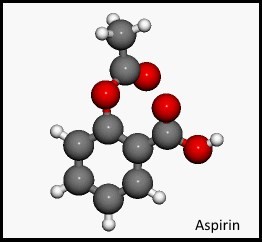The news was full of the discovery that taking some aspirin every day for ten years could somehow reduce your risk of getting cancer, particularly cancers of the gastrointestinal tract. The stomach bleeding side-effect (for some) and other as yet unknown side-effects aside, I was skeptical from the start, it just looked like a review of reviews where they looked at the idea that taking aspirin for years and years might somehow correlate with not getting cancer. To me, this is like the inverse of so many other studies that purportedly “prove” that such and such an exposure to food, pollution, toxin or whatever will “cause” cancer. Correlation is not causation.

As far as I can tell, the discovery was based on a literature review and not an actual study of the pharmacology and biochemical effects of aspirin itself. Thankfully, NHS Choices magazine, which takes a look at the science behind the headlines seems to agree. “The study was carried out by researchers from a number of institutions across Europe and the US, including Queen Mary University of London. It was funded by Cancer Research UK, the British Heart Foundation and the American Cancer Society. The study was published in the peer-reviewed medical journal Annals of Oncology.” Fine. Good.
But, says NHS Choices: “Several of the study’s authors are consultants to or have other connections with pharmaceutical companies with an interest in antiplatelet agents such as aspirin.” That’s common, and, of course, those involved in pharma research are generally connected to the industry in some way. So, not necessarily a bad thing, there are often what some might refer to as conflicts of interest in biomedical research if these are indeed conflicts here.
More worrying though, and to my mind, the real nub of the problem is what NHS Choices says about the details of the study: “It is not clear that the results are reliable from the methods reportedly used to compile this review. This is because it included studies of varying design and quality, with much of the evidence coming from observational studies, which, while useful, cannot be totally relied on to test the effectiveness of healthcare interventions.”
NHS Choices also criticises the way studies in the review were chosen: “It’s not clear how the studies included in the review were chosen and whether others on the same topic were excluded. It is also not clear whether or not this was a systematic review, where studies are rigorously appraised for their quality and criteria are established for their inclusion.”
That sounds like quite the damning indictment to me and for that reason, I for one am out.
Daily aspirin 'reduces cancer risk,' study finds – Health News – NHS Choices.